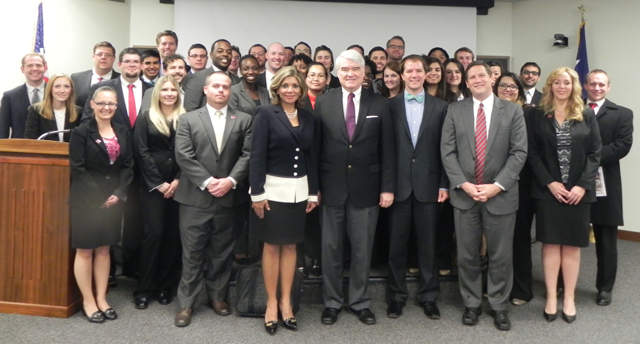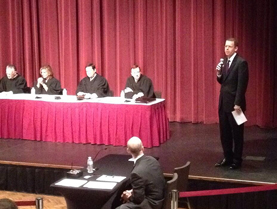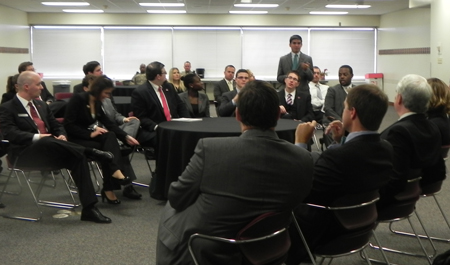Nearly 50 Texas A&M University Law students caught a 5:00 a.m. bus to College Station Thursday, Nov. 7, to hear oral arguments before the Texas Supreme Court. Although the Court has been making these “road trips” since 1998, when voters amended the state Constitution to allow proceedings outside of Austin, including a 1999 visit to Texas Wesleyan School of Law, this was the first visit to the A&M campus. It was only fitting that students from the newly-established Texas A&M University School of Law participate in the event.
 |
Texas State Supreme Court Justice Eva Guzman, Chief Justice Nathan Hecht, Justice Don R. Willett, and Justice Jeffery S. Boyd pose with Texas A&M Law students
|
Professor H. Brian Holland, an expert in appellate law, provided students with an introduction to both cases on the Court’s docket and an overview of the complex issues involved in each. Then, fueled up with Starbucks and dozens of kolaches from the Czech Stop, the students were treated to stellar arguments from each of the advocates.
Law students Suzana Jacintho and Stuart Kepler reported on the cases:
The first case, Highland Homes Ltd. v. State of Texas, involved the disbursement of unclaimed payments awarded in a class action settlement. It was particularly interesting to see the Justices question the attorneys about statutory interpretation, which we studied in our first-year Legislation and Regulation class. The Court focused primarily on applying the plain meaning of the settlement agreement between the parties, questioning the attorneys about the plain meaning of the words “owed to.” It was fascinating to hear each side advocate for completely different meanings of the term and its importance for the creation of vested property rights in the class members. Although law school certainly teaches you the importance of every detail, this case clearly demonstrated the real-life consequences of each decision. – 2L Suzana Jacintho
In re John Doe involved a timely and controversial issue: Whether a court can order Google to disclose the identity of a blogger who posted comments critical of a company, or whether that blogger is protected under the First Amendment right to anonymous speech. The litigants’ analyses on the levels of protection afforded to certain types of speech were thought provoking, in large part because the case involved a relatively new but now common technology used by many people. Throughout the argument and in its questioning of the advocates, the Court was clearly wrestling with fundamental questions, including the very power of the Texas courts to issue such an order. It was fascinating to watch. -- 2L Stuart Kepler
 Following oral arguments, Law School Interim Dean Aric Short introduced the Court's question and answer session in Rudder Theater.
Following oral arguments, Law School Interim Dean Aric Short introduced the Court's question and answer session in Rudder Theater.
The law students then had the opportunity to meet with several of the Supreme Court Justices in a small group setting. The members of the Court were incredibly generous with their time, answering questions in a relaxed and personal manner, and taking many photos with the students.
The law students also took the time to have lunch with undergraduate pre-law students, passing on their own experiences to those who would follow them to law school.
In addition to Professor Holland and Dean Short, Maxine Harrington, Associate Dean for Academic Affairs, and Terence Cook, Director of Admissions & Scholarships, joined the students for the trip to College Station.
Third-year law student Thomas Looney summed up the day this way: “This was the highlight of my law school career so far.”
 |
Texas Supreme Court Justices take questions from Texas A&M Law students
during the break-out session
|